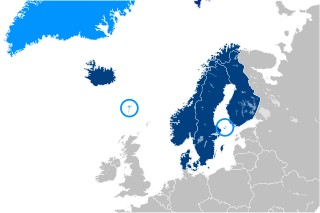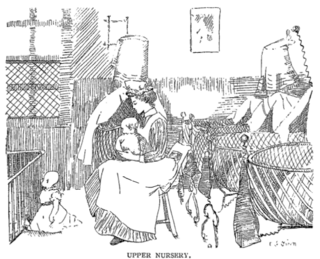
A pension is a fund into which amounts are paid regularly during the individual's working career, and from which periodic payments are made to support the person's retirement from work. A pension may be:

Welfare, or commonly social welfare, is a type of government support intended to ensure that members of a society can meet basic human needs such as food and shelter. Social security may either be synonymous with welfare, or refer specifically to social insurance programs which provide support only to those who have previously contributed, as opposed to social assistance programs which provide support on the basis of need alone. The International Labour Organization defines social security as covering support for those in old age, support for the maintenance of children, medical treatment, parental and sick leave, unemployment and disability benefits, and support for sufferers of occupational injury.

National Insurance (NI) is a fundamental component of the welfare state in the United Kingdom. It acts as a form of social security, since payment of NI contributions establishes entitlement to certain state benefits for workers and their families.

Employee benefits and benefits in kind, also called fringe benefits, perquisites, or perks, include various types of non-wage compensation provided to employees in addition to their normal wages or salaries. Instances where an employee exchanges (cash) wages for some other form of benefit is generally referred to as a "salary packaging" or "salary exchange" arrangement. In most countries, most kinds of employee benefits are taxable to at least some degree. Examples of these benefits include: housing furnished or not, with or without free utilities; group insurance ; disability income protection; retirement benefits; daycare; tuition reimbursement; sick leave; vacation ; social security; profit sharing; employer student loan contributions; conveyancing; long service leave; domestic help (servants); and other specialized benefits.

Clement Attlee was invited by King George VI to form the Attlee ministry in the United Kingdom in July 1945, succeeding Winston Churchill as Prime Minister of the United Kingdom. The Labour Party had won a landslide victory at the 1945 general election, and went on to enact policies of what became known as the post-war consensus, including the establishment of the welfare state and the nationalisation of some industries. The government's spell in office was marked by post-war austerity measures, the violent crushing of pro-independence and communist movements in Malaya, the grant of independence to India, the engagement in the Cold War against Soviet Communism as well as the creation of the country's National Health Service (NHS).

Harold Wilson was appointed Prime Minister of the United Kingdom by Queen Elizabeth II on 16 October 1964 and formed the first Wilson ministry, a Labour government, which held office with a thin majority between 1964 and 1966. In an attempt to gain a workable majority in the House of Commons, Wilson called a new election for 31 March 1966, after which he formed the second Wilson ministry, a government which held office for four years until 1970.

The Labour Party governed the United Kingdom of Great Britain and Northern Ireland from 1974 to 1979. During this period, Harold Wilson and James Callaghan were successively appointed as Prime Minister by Queen Elizabeth II. The end of the Callaghan ministry was presaged by the Winter of Discontent, a period of serious industrial discontent. This was followed by the election of Conservative leader Margaret Thatcher in 1979.
Social security, in Australia, refers to a system of social welfare payments provided by Australian Government to eligible Australian citizens, permanent residents, and limited international visitors. These payments are almost always administered by Centrelink, a program of Services Australia. In Australia, most payments are means tested.
In the United Kingdom statutory sick pay (SSP) is paid by an employer to all employees who are off work because of sickness for longer than 3 consecutive workdays (or 3 non-consecutive workdays falling within an 8 week period) but less than 28 weeks and who normally pay National Insurance contributions (NICs), often referred to as earning above the Lower Earnings Limit (LEL). Days on which the employee would normally have worked are referred to as qualifying days; the first three of these, known as waiting days, are unpaid unless the employee has qualified for SSP within the previous 8 weeks and this included waiting days. Between 13 March 2020 and 25 March 2022, SSP was also paid from the first qualifying day if the employee was self isolating on medical advice relating to COVID-19. SSP is £109.40 per week for 2023/24. SSP is not paid to a number of categories of employees, including:
Social security in India includes a variety of statutory insurances and social grant schemes bundled into a formerly complex and fragmented system run by the Indian government at the federal and the state level. The Directive Principles of State Policy, enshrined in Part IV of the Indian Constitution reflects that India is a welfare state. Food security to all Indians are guaranteed under the National Food Security Act, 2013 where the government provides highly subsidised food grains or a food security allowance to economically vulnerable people. The system has since been universalised with the passing of The Code on Social Security, 2020. These cover most of the Indian population with social protection in various situations in their lives.

Indian labour law refers to law regulating labour in India. Traditionally, the Indian government at the federal and state levels has sought to ensure a high degree of protection for workers, but in practice, this differs due to the form of government and because labour is a subject in the concurrent list of the Indian Constitution. The Minimum Wages Act 1948 requires companies to pay the minimum wage set by the government alongside limiting working weeks to 40 hours. Overtime is strongly discouraged with the premium on overtime being 100% of the total wage. The Payment of Wages Act 1936 mandates the payment of wages on time on the last working day of every month via bank transfer or postal service. The Factories Act 1948 and the Shops and Establishment Act 1960 mandate 15 working days of fully paid vacation leave each year to each employee with an additional 7 fully paid sick days. The Maternity Benefit (Amendment) Act, 2017 gives female employees of every company the right to take 6 months' worth of fully paid maternity leave. It also provides for 6 weeks worth of paid leaves in case of miscarriage or medical termination of pregnancy. The Employees' Provident Fund Organisation and the Employees' State Insurance, governed by statutory acts provide workers with necessary social security for retirement benefits and medical and unemployment benefits respectively. Workers entitled to be covered under the Employees' State Insurance are also entitled to 90 days worth of paid medical leaves. A contract of employment can always provide for more rights than the statutory minimum set rights. The Indian parliament passed four labour codes in the 2019 and 2020 sessions. These four codes will consolidate 44 existing labour laws. They are: The Industrial Relations Code 2020, The Code on Social Security 2020, The Occupational Safety, Health and Working Conditions Code, 2020 and The Code on Wages 2019.

Social security or welfare in Finland is very comprehensive compared to what almost all other countries provide. In the late 1980s, Finland had one of the world's most advanced welfare systems, which guaranteed decent living conditions to all Finns. Created almost entirely during the first three decades after World War II, the social security system was an outgrowth of the traditional Nordic belief that the state is not inherently hostile to the well-being of its citizens and can intervene benevolently on their behalf. According to some social historians, the basis of this belief was a relatively benign history that had allowed the gradual emergence of a free and independent peasantry in the Nordic countries and had curtailed the dominance of the nobility and the subsequent formation of a powerful right wing. Finland's history was harsher than the histories of the other Nordic countries but didn't prevent the country from following their path of social development.

Child care in the United Kingdom is supported by a combination of rights at work, public sector provision and private companies. Child care is usually undertaken by the parents, and more often the mother who takes leave from employment. Early childhood education in a crèche or nursery is not freely available from the public sector, while fee-paying pre-schools are.

The Maternity and Parental Leave etc. Regulations 1999 is a statutory instrument, concerning UK labour law, which details the rights to maternity and parental leave for employees in the United Kingdom.
Elterngeld is a transfer payment dependent on net income as compensation for concrete disadvantages in the early phase of starting a family and thus a parent-related, temporary compensation payment. The parental allowance replaces the previous child-raising allowance. Parents who are not or not fully employed due to the care of a child or who interrupt their employment for the care of their child are entitled to parental benefit. It is intended to support parents in securing their livelihood and is therefore designed as a compensation payment.
This page is based on this
Wikipedia article Text is available under the
CC BY-SA 4.0 license; additional terms may apply.
Images, videos and audio are available under their respective licenses.










